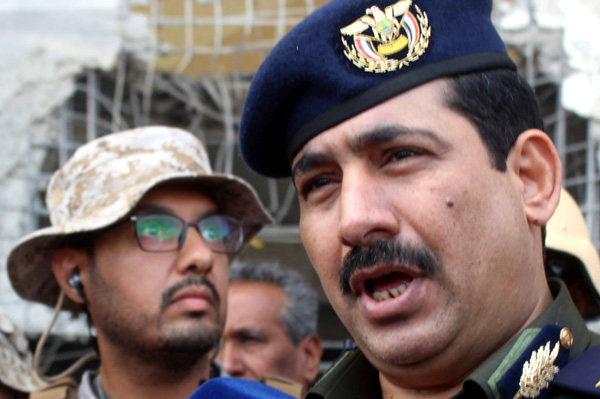
The Yemeni interior minister said the Houthi militias, helped by Iranian and Lebanese experts, were behind the strikes that targeted Aden airport on December 30.
The results of investigations by the Yemeni government about the Aden airport attack underline the danger posed by missiles Iran has supplied to the Houthis, which have seriously threatened energy security in the region since the Abqaiq-Khurais attack of September 2019.
These missiles threaten the security of international shipping lanes in the Red Sea, considered to be among the most vital strategic oil-shipping waterways in the world.
On Thursday, the Yemeni government accused the Houthis of being behind an attack on Aden International Airport in southern Yemen on December 30, timed to coincide with the arrival of the new Yemeni government on a flight from Saudi Arabia.
The accusations were levelled at the Iran-backed militias by Yemeni Interior Minister Ibrahim Haydan during a press conference in Aden.
“The attack was carried out with the use of three medium-range surface-to-surface missiles that were launched from a distance of more than 100 kilometres, using a navigation system that relied on a precise GPS- guided technology,” Haydan said.
He added that after “the investigations, which were aided by the collection of data, camera photos and missile debris as well as the analysis of missiles, their angle of impact and blast craters, and the use of inspection and examination results, it became clear that the Houthi militias, with the help of Iranian and Lebanese experts, carried out the terrorist attack using three medium-range surface-to-ground ballistic missiles with a range of 70 to 135 km.”
Haydan revealed that the used missiles had serial numbers similar to those of missiles with the same technology that Houthi militias previously used to target military and civilian sites in the Marib governorate, as well as Saudi Aramco oil facilities in Abqaiq and Khurais.
Observers of Yemeni affairs believe that investigations conducted by the Yemeni government confirmed that Iran was behind the airport attack after smuggling advanced missiles to Sana’a. The investigation also confirmed suspicions that experts affiliated with Iran and the Lebanese Hezbollah group had trained Houthi rebels on how to use such technology to target Aden and Saudi oil installations.
Over the past few years, Iran has succeeded in delivering sophisticated weapons to the Houthis, enabling them to continue their war and expand their threat on Saudi soil and international shipping lanes in the Bab al-Mandeb Strait and the Red Sea.
The Saudi-led Arab coalition supporting the legitimacy camp in Yemen has long accused Iran’s Islamic Revolutionary Guard Corps (IRGC) of providing the Houthis with “advanced capabilities,” including ballistic missiles and drones that enable them to target sites inside Saudi Arabia.
Regional analysts see in Iran’s actions strong messages of defiance to regional and international bodies working for a lasting peace in Yemen, as well as to parties concerned with energy security, including the United States, European nations and other countries that depend on oil from the Gulf region.
While the United States waved the threat of striking at Iranian sites if energy security was threatened or if attacks were carried out by militias loyal to Tehran on American sites in the region, Israel was the only country to have launched precise strikes to prevent these missiles from being stationed in Syria or being smuggled to Lebanon considering the risks that these missiles pose to security and the perception of their qualitative edge in advanced military capabilities.
Recent developments show that Israel is in a race against time to carry out successive strikes on Iranian sites in Syria. These strikes, experts say, are aimed at preventing Iran from building up any permanent positions in Syria, especially ballistic missile launch centres that pose a regional security threat.
Sources told The Arab Weekly on Wednesday that the Israeli strikes that targeted areas close to the Syria-Iraq border were intended as a clear message confirming that Israel will not accept the presence of Iranian missiles in Syria or in Lebanon in the future, regardless of whether the US administration of President-elect Joe Biden succeeds in reviving the Iran nuclear agreement.
 Eurasia Press & News
Eurasia Press & News


